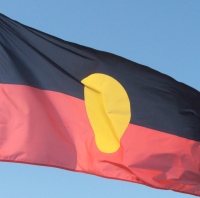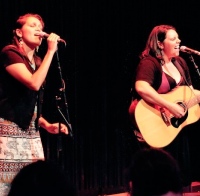- About Us
- Columns
- Letters
- Cartoons
- The Udder Limits
- Archives
- Ezy Reading Archive
- 2024 Cud Archives
- 2023 Cud Archives
- 2022 Cud Archives
- 2021 Cud Archives
- 2020 Cud Archives
- 2015-2019
- 2010-2014
- 2004-2009
 |
The Stiff Gins |
Despite living in a cynical age, most of us believe in personal improvement. We like to think that over the years we have become better at the most valuable things in our lives, such as our relationships with individuals, our social responsibilities and our use of the natural environment. It is inspiring to encounter public figures who not only strive to be better but who demonstrate that continual improvement is possible. Every year it seems, the musical duo called the Stiff Gins set new standards for outstanding performances in a unique style.
 One aspect of the Stiff Gins’ remarkable achievement is that Nardi Simpson and Kaleena Briggs mostly perform their own compositions. Between them they draw on the cultures of major Aboriginal tribes including the Kamilaroi and the Wiradjuri, whose traditional lands together cover much of the area now called New South Wales. Without being overly sentimental or attempting to preach, their songs express the senses of loss and longing that are the everyday lot of Indigenous peoples. Their lyrics, mostly in English are readily accessible and give any non-Indigenous person willing to listen, keen insights to the Aboriginal experience.
One aspect of the Stiff Gins’ remarkable achievement is that Nardi Simpson and Kaleena Briggs mostly perform their own compositions. Between them they draw on the cultures of major Aboriginal tribes including the Kamilaroi and the Wiradjuri, whose traditional lands together cover much of the area now called New South Wales. Without being overly sentimental or attempting to preach, their songs express the senses of loss and longing that are the everyday lot of Indigenous peoples. Their lyrics, mostly in English are readily accessible and give any non-Indigenous person willing to listen, keen insights to the Aboriginal experience.
While some of their songs address tragic themes, there is great joy in any performance by the Stiff Gins. Especially when they incorporate some Koori languages in their songs, they give a firm hope of survival and empowerment. It is evident that they gain strength from key elements of the Aboriginal spirit, including their relationships with kin and with the natural world. Their recent CD ‘Wind Water’ expresses these elements perfectly. All music has the potential to speak on a spiritual plane. A great American folksinger said that while words appeal to the head and music to the stomach, songs can reach the heart. There is a distinct atmosphere of the sacred in the respectful way that the Stiff Gins use traditional language.
The harmonies generated by Nardi and Kaleena have always been extraordinary. After many performances over something like a decade, the Stiff Gins’ have achieved an understanding and a sense of ensemble that is almost like a third presence. There is no ego on stage with the Stiff Gins. The beautiful harmonies, the sincerity of these two women and the humility and humour with which they perform, create a warmth that enfolds the audience and elicits the feeling that here is a moment of rare privilege.
Audiences always appreciate it when performers take risks. In one of the most moving songs the Stiff Gins performed at the recent Kangaroo Valley Folk Festival, Nardi described the experience of discovering that her grandfather had a second family. She found new aunties and uncles only when one died. The emotions expressed in this song were as real as one gets. Of course the Stiff Gins are no strangers to risk. Their very name is risky because the term ‘Gin’ has been applied to Aboriginal women with derogatory intent. When Nardi and Kaleena heard of someone fortifying herself with a good stiff gin, they decided that being a source of strength was not a bad aspiration.
Perhaps one reason I find the Stiff Gins so compelling is that for the past forty years, I have lived on Kamilaroi and Wiradjuri land and have attempted to find ways to do so justly. When I first came to the bush, an elderly Indigenous man told me that the correct discourse about the races was ‘Abos’ and ‘Gubbas’. He was warning me against other derogatory terms that I might encounter. Kooris had reclaimed the term ‘Abo’ and used it readily. One way of isolating and disadvantaging people is to discuss them in terms they are unlikely to use about themselves. This excludes them from conversations and dialogues and renders them objects rather than participants. This happens to people with disabilities, and to anyone whose otherness we want to turn into a handicap. It is a common weapon of racists, sexists and all discriminatory elitists.
This happens to people with disabilities, and to anyone whose otherness we want to turn into a handicap. It is a common weapon of racists, sexists and all discriminatory elitists.
This process has been identified recently regarding asylum seekers. If we adopt cruel and patronising tags such as ‘illegals’ and ‘queue-jumpers’ then we exclude them from any discussion about their future and about our responsibilities towards them. It seems very likely that historians will conclude that many aspects of our treatment of asylum seekers are direct continuations of discriminatory and demeaning behaviours we have used towards Indigenous peoples. It is difficult to understand how we can be so ignorant as to imagine that we ourselves will not suffer enormously when we treat people like this.
Whether audience members regard the songs of the Stiff Gins as explicitly political or not, the very name of the duo is implicitly political. Stiff Gins have reclaimed the term from those who have sought to objectify Indigenous women and by embracing the title proudly they have also helped strengthen all Indigenous people and all women in their struggles against prejudice. The survival of Indigenous peoples is an example of defiance. The longevity of the Stiff Gins is remarkable enough, but that their music gets better and better is something for which all of us, Indigenous or not, should be grateful.
Tony Smith is author of ‘Master of Dissent: the Music of John Dengate’, Australian Quarterly, 76(2), March-April 2004. A former academic, he has written extensively on a wide range of subjects as diverse as folk music and foreign policy issues in the Australian Review of Public Affairs, the Journal of Australian Studies Review of Books, Overland, the Australian Quarterly, Eureka Street, Online Opinion and Unleashed.
